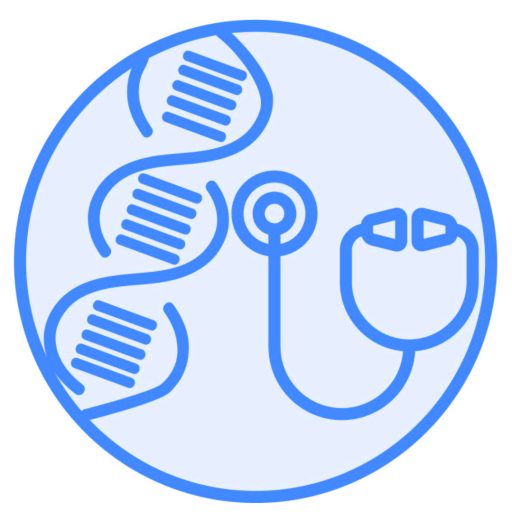The Hong Kong Genome Institute (HKGI), established and wholly owned by the Hong Kong SAR Government (Government), commenced full operations in 2021. With the vision “to avail genomic medicine to all for better health and well-being” and supported by the Health Bureau, HKGI works in close collaboration with the Department of Health, Hospital Authority, medical schools of local universities and other stakeholders to accelerate the development of genomic medicine in Hong Kong along four strategic foci: integrate genomics into medicine, advance research, nurture talents and enhance public genomic literacy.
Establishment
The Government established the Steering Committee on Genomic Medicine in December 2017 to map out the strategies for developing genomic medicine in Hong Kong and subsequently set up HKGI upon the recommendation of the Steering Committee to promote the city’s long-term development of genomic medicine, with the Hong Kong Genome Project (HKGP) as HKGI’s first key initiative.
HKGP, being the first large-scale genome sequencing project in Hong Kong, serves as a catalyst to benefit patients and their families with more precise diagnosis and personalised treatment through whole genome sequencing (WGS). It also aims to establish genome database of the local population, testing infrastructure and talent pool to address the healthcare needs of Hong Kong in the long run.
As the first step towards achieving its vision, HKGI launched the HKGP in 2021 focusing on diseases and research cohorts that would benefit from WGS. They include undiagnosed diseases, hereditary cancer and cases related to genomics and precision health.
HKGI has set up Partnering Centres at the Hong Kong Children’s Hospital, Prince of Wales Hospital and Queen Mary Hospital, as well as referring networks including Alice Ho Miu Ling Nethersole Hospital, Grantham Hospital, Pok Oi Hospital, The Duchess of Kent Children’s Hospital at Sandy Bay, Tin Shui Wai Hospital, Tuen Mun Hospital and Tung Wah Hospital to help recruit eligible participants with informed consent, while also keeping other relevant stakeholders closely engaged. The results of sequencing analysis will be fed back to respective clinical leads and patients once available to aid diagnoses and clinical services.
Vision
To avail genomic medicine to all for better health and well-being.
Mission
To accelerate the integration of genomics into medicine by driving clinical application, advancing research, nurturing talents and enhancing genomic literacy.
Core Values
The core values of HKGI are embedded in its logo of a five-colour double helix structure with dark green as the primary logo colour signifying the fundamental HKGI spirit of professionalism and reliability, as well as the lines in green, red, blue, and yellow, which apart from being the colour codes representing ATCG (A – Adenine, T – Thymine, C – Cytosine, and G – Guanine), the four different bases of DNA nucleotides, also symbolise the HKGI values of “health and new life”, “passion and dedication”, “hope and happiness”, and “versatility and energy” respectively.


Professionalism and Reliability
To provide Whole Genome Sequencing, laboratory, genetic counselling, genetic education, bioinformatics, research facilitation and related services with professionalism and reliability, observing relevant professional guidelines, ethical codes, standardised protocols as well as principles of data privacy and security.
Passion and Dedication
To achieve HKGI’s vision and mission with passion and dedication, working wholeheartedly, thinking positively and taking the initiative to go the extra mile to serve patients and the wider community in a better way.
Versatility and Energy
To adopt a multidisciplinary approach for engaging professionals from various disciplines to promote the development of genomic medicine with vibrant means, energetic efforts and teamwork, embracing the spirit of openness, mutual respect, and acceptance of different ideas.
Hope and Happiness
To bring hope and happiness to patients and their families by fostering the integration of genomic medicine into clinical care to improve genomic diagnosis, personalised treatment and prevention of diseases.
Health and New Life
To promote health and better quality of life amongst patients and the people of Hong Kong by facilitating the advancement of knowledge and technology in genomic medicine through vigorous research as well as the translation of research breakthroughs into clinical practice.
 Integrate Genomic Medicine into Clinical Care
Integrate Genomic Medicine into Clinical Care
Driving the incorporation of genomic medicine into the mainstream of medical development in Hong Kong by improving genomic diagnosis, personalised treatment as well as personalised prediction and prevention of disease risks. This is done by showcasing the clinical usefulness of WGS in focused disease areas and the functional/economic benefits of embedding genomics into routine clinical care.
 Advance Research in Genomic Science
Advance Research in Genomic Science
Facilitating genomic science and discoveries by establishing a flexible platform with rich database for new genomic technologies and multi-omics studies, as well as disease-focused research networks through local and international collaborations. Core to this will be setting up the necessary infrastructure including facilitating the development of a local biobank network and promoting local and international collaborations in genomic research.
 Nurture Talents in Genomic Medicine
Nurture Talents in Genomic Medicine
Developing skilled and competent professionals to deliver genomic medicine through collaborations with local universities, professional bodies and healthcare institutions to enhance training and development of the related professions, including organising continuing professional development programmes for clinicians, genetic counsellors, bioinformaticians and medical laboratory technologists, etc.
 Enhance Public Genomic Literacy and Engagement
Enhance Public Genomic Literacy and Engagement
Promoting genomic literacy in Hong Kong, particularly amongst healthcare workers and students, by engaging and collaborating with relevant government departments, schools, universities and non-government organisations to initiate public education programmes in genetics and genomics.
